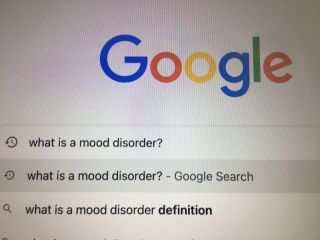Mental Health Stigma
When Google Becomes My Worst Enemy
Personal Perspective: I avoid the term “mood disorder” in describing bipolar II.
Posted February 29, 2024 Reviewed by Ray Parker

Whether it’s a friend, a colleague, or someone I recently met, if my mental health diagnosis comes up, I avoid describing it as a mood disorder.
When I hear mood, I think of moody, which carries a stigma. All these negative words pop into my head like she’s difficult, unpredictable, and annoying, and when Google enters the picture, it only gets worse.
Bipolar II, also known as hypomania, is one type of mood disorder, and if someone is not familiar with it, they might go straight to Google to find out more. For the most part, people turn to Google to learn about something they don’t know or want to understand better, and when this happens, Google becomes my worst enemy.
When you Google mood disorder, it is defined as the following: A mood disorder is a mental health condition that mainly affects your emotional state. People with mood disorders often experience long periods of extreme emotional highs and lows. There are a few different types of mood disorders, but two of the most common types are depression and bipolar disorder.
So, it’s a disorder that affects my “emotional state.”
Here, I am met with a stereotype or stigmatized term. Often, the word emotional is tethered to a woman more so than a man, and women can be stereotyped as emotional in a negative way. This is unfortunate and doesn’t describe me, but it is completely out of my hands.
Then Google continues to describe my condition as the following: Mood disorders are common psychiatric disorders leading to an increase in morbidity and mortality.
So, it’s a disease that expedites my mortality and leads to death.
That might be one of the worst explanations of a mood disorder when the term “death” is associated with it. Do I believe this? No, but Google continues to have a grip on me.
Sometimes, we don’t think about how someone with a condition or disease carries other words or connotations that they have to deal with or endure. You never know how people take in hearing certain terms, which is not an easy pill to swallow when words carry so much weight.
Google doesn’t help this matter.
When Google takes charge, it all seems detrimental to explaining the reality of living with a mood disorder. I try to avoid saying that bipolar II falls under the umbrella of a mood disorder, although Google dictates that it does. I realize this is my hang-up and personal issue, but it doesn’t detract from the fact that, for the most part, those who are not familiar with mood disorders might simply research it, and the results aren’t so positive, nor do they define me.
Have I lost out on potential dates because of Google? Probably, but there’s not much I can do about it. Has it affected other relationships in my life when people research it? Probably, but most people aren’t going to admit they Googled the term and read all this information, which can affect how they might perceive me and how they proceed with getting to know me or engage with me.
I’ll probably never call bipolar II a mood disorder because I don’t want to be considered a moody woman or be associated with any of the other terms or definitions one can find online. The complexities of any mood disorder can’t be labeled to describe what it’s truly like to have one. When you tell someone you have a more known condition or ailment, you might proceed with a conversation about it. When you tell someone you have a mood disorder, you might be met with silence. At least until they run home and Google it.
There are a variety of mood disorders found online, and Google lists the following: Bipolar disorder, cyclothymia, hypomania, major depressive disorder, disruptive mood dysregulation disorder, persistent depressive disorder, and premenstrual dysphoric disorder.
Although I am unfamiliar with most of these diagnoses, I can’t imagine what Google has to say about them. If someone wants to go down the Google rabbit hole as a device for education versus having an open conversation on the matter, that’s on them.
Thanks, but no thanks, Google.
Next time you consider Googling any condition you might not know about, maybe be wary of what Google throws out there. There are other vehicles to attaining knowledge, and when you have a real conversation with the person or seek out other resources, you will learn something outside of a Google go-to “informational” stream.




